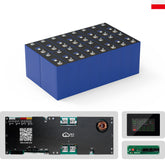Are All 12V Car Batteries Identical
When it comes to choosing the right 12V car battery for your vehicle, many car owners assume that all 12V batteries are essentially the same. After all, they all serve the same basic function: to power your car’s electrical systems and start the engine. However, the reality is far from simple. While 12V car batteries share a standard voltage rating, they vary widely in terms of size, technology, and specific applications. Understanding these differences can help you make an informed decision when replacing or upgrading your battery.
- What Is a 12V Car Battery?
- Types of 12V Car Batteries
- Factors That Differentiate 12V Car Batteries
- How to Choose the Right 12V Car Battery
- The Impact of Choosing the Wrong 12V Car Battery
In this article, we’ll explore why 12V car batteries are not all identical and how various factors such as type, performance, and compatibility can affect your car’s reliability and efficiency.
What Is a 12V Car Battery?
A 12V car battery is the heart of your vehicle’s electrical system. It provides the necessary power to start the engine and operates essential components such as lights, radio, and air conditioning. The 12-volt system has been the standard for automobiles since the 1950s, and it is widely used in most cars today.
At its core, a 12V car battery is a lead-acid battery, which consists of six cells connected in series. Each cell generates around 2 volts, and when combined, they create the 12 volts necessary to power the car. This standard voltage is critical because most car electrical systems are designed to work with 12 volts, which is why any deviation from this can lead to complications.
>>See also How Do You Tell If A 12v Battery Is Fully Charged
Types of 12V Car Batteries
While all 12V car batteries share the same basic function, there are several different types to choose from. Each type is suited for specific needs and applications. The main types of 12V car batteries include:
1. Lead-Acid Batteries
Traditional lead-acid batteries are the most common type of 12V battery found in vehicles. These batteries are cost-effective, reliable, and have been in use for over a century. Lead-acid batteries consist of lead plates submerged in a sulfuric acid solution. When the battery discharges, a chemical reaction takes place between the lead plates and acid, releasing electrical energy.
Lead-acid batteries come in two major categories:
- Flooded Lead-Acid Batteries (FLA): These are the most affordable and commonly used. They require regular maintenance, such as checking water levels.
- Absorbent Glass Mat (AGM) Batteries: AGM batteries are a more advanced version of the lead-acid battery. They are sealed, maintenance-free, and offer higher performance and reliability compared to flooded batteries.
2. Lithium-Ion Batteries
Lithium-ion batteries are becoming increasingly popular in modern vehicles, especially electric vehicles (EVs) and hybrid vehicles. While not as common in traditional gas-powered cars, 12V lithium-ion car batteries are used in specific applications due to their light weight, longer lifespan, and ability to charge faster. Lithium-ion batteries are more expensive than traditional lead-acid batteries, but they offer superior performance and durability.
3. Gel Batteries
Gel batteries are similar to AGM batteries but use a gel-like electrolyte instead of a liquid. This design helps to prevent acid leakage, making gel batteries a safer option for certain vehicles. These batteries offer excellent deep-cycle performance and are less prone to damage from vibration, making them ideal for off-road vehicles and RVs.
4. EFB Batteries (Enhanced Flooded Battery)
Enhanced Flooded Batteries (EFB) are an improved version of traditional flooded lead-acid batteries. They are typically used in vehicles with start-stop systems, where the engine frequently turns on and off. EFB batteries are more resistant to deep discharges and can withstand the high power demands of start-stop technology. They are also more affordable than AGM or lithium-ion batteries, making them a popular choice for budget-conscious car owners.
Factors That Differentiate 12V Car Batteries
While all 12V car batteries may seem similar at first glance, several factors differentiate them. Understanding these differences is crucial for selecting the right battery for your vehicle.
1. Battery Size and Group Number
Not all 12V car batteries are the same size. The physical dimensions and design of the battery are essential for compatibility with your vehicle. Car manufacturers specify the size and type of battery that should be used in a specific make and model.
The battery group number is a code that indicates the size, terminal configuration, and type of battery that fits your vehicle. When shopping for a replacement, always check the battery group number to ensure a perfect fit.
2. Cold Cranking Amps (CCA)
Cold Cranking Amps (CCA) refer to a battery's ability to start an engine in cold temperatures. It measures how many amps a battery can provide at 0°F for 30 seconds while maintaining at least 7.2 volts. Vehicles in colder climates typically require a battery with a higher CCA rating, as low temperatures can reduce the battery's ability to provide sufficient power.
3. Reserve Capacity (RC)
Reserve Capacity (RC) indicates how long a battery can provide power to the vehicle’s electrical systems if the alternator fails. This is a critical feature in case of an emergency, as it determines how long the vehicle can run on battery power alone. A higher RC is desirable for vehicles that rely heavily on electronics or for drivers who often take long trips.
4. Battery Lifespan and Warranty
Not all 12V car batteries have the same lifespan. Lead-acid batteries typically last between 3 and 5 years, while lithium-ion batteries can last up to 10 years, depending on usage. Battery warranties also vary, with more expensive options offering longer warranty periods and better coverage.
5. Maintenance Requirements
Some 12V car batteries, like flooded lead-acid batteries, require regular maintenance, such as checking electrolyte levels and cleaning the terminals. AGM, gel, and lithium-ion batteries, on the other hand, are maintenance-free and more convenient for busy car owners. If you prefer a hassle-free experience, opting for a maintenance-free battery might be a better choice.
How to Choose the Right 12V Car Battery
Choosing the right 12V car battery depends on several factors, including your vehicle’s requirements, budget, and preferences. Here’s how to make an informed decision:
1. Check Your Vehicle’s Specifications
The first step is to check your vehicle’s owner’s manual or consult a professional to determine the correct size, group number, and type of battery for your car. Some vehicles may require a specific type of 12V car battery to ensure proper functionality.
2. Consider Your Driving Conditions
If you live in a cold climate, you may need a battery with a higher CCA rating to ensure reliable starting in freezing temperatures. Similarly, if you drive long distances regularly, you may want to choose a battery with a higher RC rating.
3. Compare Prices and Brands
While it can be tempting to opt for the cheapest 12V car battery, it’s important to consider the long-term costs. Batteries with better performance and longer lifespans may cost more upfront but will save you money in the long run by reducing the need for frequent replacements.
4. Think About Maintenance
If you don’t want to worry about checking water levels or cleaning terminals, consider investing in a maintenance-free 12V car battery. AGM and lithium-ion batteries are excellent choices for those seeking convenience.
>>See also How To Connect Solar Panels To RV Batteries
The Impact of Choosing the Wrong 12V Car Battery
Choosing the wrong 12V car battery can have several negative consequences for your vehicle. A battery that doesn’t fit correctly or doesn’t meet your car’s electrical needs may lead to poor performance, frequent breakdowns, and a shortened lifespan. Furthermore, using a battery with an insufficient CCA rating can result in difficulty starting the engine, especially in cold weather.
Additionally, selecting a lower-quality battery may void your vehicle’s warranty or lead to more frequent battery replacements, which can become costly over time. Therefore, it’s essential to select a 12V car battery that aligns with your vehicle's specifications and your driving conditions.
In conclusion, while all 12V car batteries share the same basic voltage, they are far from identical. Variations in size, technology, performance, and maintenance requirements make it crucial for car owners to choose the right battery for their specific needs. By understanding the differences between battery types, performance ratings, and maintenance requirements, you can ensure your vehicle’s electrical system operates smoothly and reliably for years to come.
When selecting a new 12V car battery, always consult your car’s manual, consider your driving conditions, and compare different options to find the best fit. The right battery will not only power your vehicle’s systems but will also help protect your car’s overall performance and longevity.
If you’re in the market for a new 12V car battery, take the time to choose wisely, and you’ll enjoy a hassle-free driving experience for many years to come.
























Leave a comment
All blog comments are checked prior to publishing